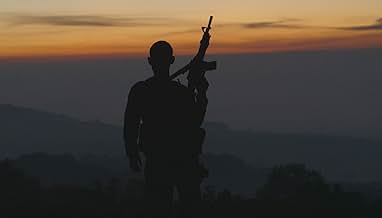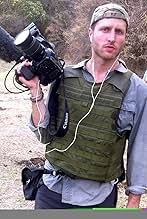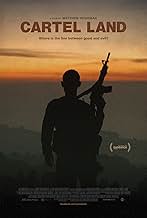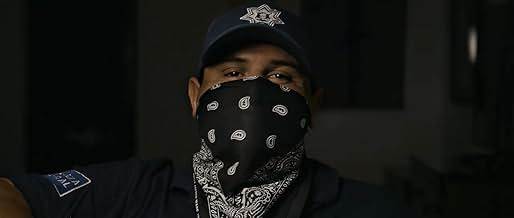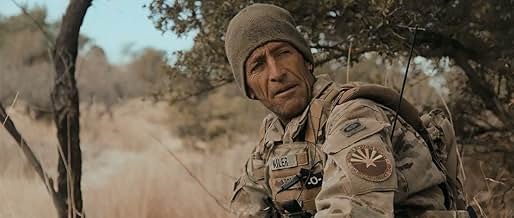AVALIAÇÃO DA IMDb
7,3/10
19 mil
SUA AVALIAÇÃO
O cineasta Matthew Heineman examina o estado do atual problema das drogas ao longo da fronteira entre os EUA e o México.O cineasta Matthew Heineman examina o estado do atual problema das drogas ao longo da fronteira entre os EUA e o México.O cineasta Matthew Heineman examina o estado do atual problema das drogas ao longo da fronteira entre os EUA e o México.
- Indicado a 1 Oscar
- 19 vitórias e 38 indicações no total
Nicolás Sierra
- Self
- (as as Nicolás Sierra 'El Gordo')
Alfredo Castillo Cervantes
- Self - Mexican political
- (as Alfredo Castillo)
María Imilse Arrué
- Self
- (as María Imilse)
Avaliações em destaque
This documentary is about Mexico and cartels, but it is also about vigilantism in general. Is it OK to take the law into your own hands? Does this freedom corrupt? The documentary explores two (related) instances of vigilantism, and it does so in a critical, but nuanced way. It reflects upon the motives of the people involved, and their situation. This exploration is what really makes this documentary great. It throws some light on the situation in Mexico in a way that is both thrilling and heartbreaking - but by focusing on the acts of the vigilantes, the documentary becomes timeless.
The people behind this went to great lengths to get some really(!) impressive footage. How they convinced people involved to let them film all of this is beyond me.
A warning though: There were some scenes here where I had to look away because of the images shown.
The people behind this went to great lengths to get some really(!) impressive footage. How they convinced people involved to let them film all of this is beyond me.
A warning though: There were some scenes here where I had to look away because of the images shown.
Although he hasn't made the technical "best" documentary of the year), it's hard to see a documentary filmmaker who stuck his neck out more, literally, than Matthew Heienman to make Cartel Land (maybe Joshua Oppenheimer, in his way, put himself in danger to make his Indonesia docs, but he wasn't caught up in anything like this). He puts himself into some incredibly dangerous scenes, and from what I could tell it's not at all the case of him trying to get some extra dramatics or tension where there is none. On the contrary he follows the Mexican group the Autodefensas (at times when they are in the midst of shoot-outs and enemy fire) in their rise to become a major presence in Michoacan, Mexico, as well as how they became corrupted by the very forces they are/were up against.
So points automatically have to go to the director for that, and he clearly is passionate about this issue - and as the wisest choice he doesn't put himself into it in the slightest (very much the objective, here and there more like a war cine-journalist when with his camera on the streets and roads and interrogation rooms). But I do wish that he had stuck to the story of the Doctor Meirelles and his group, as he and the world that he's in is just more captivating and stronger as a story of a rise and fall than that of the American who is supposed to be the 'counter-point' or other side example.
His story, as a man who has split off from society (in part due to the 2008 economic collapse, among other issues), and formed a small would be (?) militia patrolling parts of the Mexican border for immigrants, could be compelling. But it's not even so much that the contrast or point-counter-point of him and the Doctor might not have some interest (I think the point ultimately is one guy really is fighting for his life and for others, and the other is more about rounding up illegal immigrants where, for some reason, border patrol doesn't seem to be around), it's more a flaw of filmmaking. I think that if Heineman had kept it all down as a story of the Autodefensas, he would have a full movie to tell, and indeed the two places - on the US/Mexico border and Michoacan, which is over a thousand miles away to the south - are so far apart that they don't have much relation to one another exactly. Of course the cartels are a problem in one spot as much as the other, yet on a simple film editing level, it throws off the balance.
This could have been two documentaries, perhaps, again to bring up Oppenheimer, as compliments to one another. It's a shame that it doesn't work much better, since there's a lot of potent, incendiary stuff here. When Cartel Land works best, it all but indicts a country for not doing far more than it should, or what the president or government claims to do (again, this is the documentary, I'd have to read up more to know if the filmmaker doesn't show more sides to what the police or other military forces may or may be doing for the Autodefensas to rise up in the first place), and that corruption and crime becomes just a fact of life. It displays another form of terrorism that seems not as apparent as, say, Islamic fundamentalism but is no less a threat to the people where it takes place, though oddly enough what the film shows is the danger of vigilantism as well.
So points automatically have to go to the director for that, and he clearly is passionate about this issue - and as the wisest choice he doesn't put himself into it in the slightest (very much the objective, here and there more like a war cine-journalist when with his camera on the streets and roads and interrogation rooms). But I do wish that he had stuck to the story of the Doctor Meirelles and his group, as he and the world that he's in is just more captivating and stronger as a story of a rise and fall than that of the American who is supposed to be the 'counter-point' or other side example.
His story, as a man who has split off from society (in part due to the 2008 economic collapse, among other issues), and formed a small would be (?) militia patrolling parts of the Mexican border for immigrants, could be compelling. But it's not even so much that the contrast or point-counter-point of him and the Doctor might not have some interest (I think the point ultimately is one guy really is fighting for his life and for others, and the other is more about rounding up illegal immigrants where, for some reason, border patrol doesn't seem to be around), it's more a flaw of filmmaking. I think that if Heineman had kept it all down as a story of the Autodefensas, he would have a full movie to tell, and indeed the two places - on the US/Mexico border and Michoacan, which is over a thousand miles away to the south - are so far apart that they don't have much relation to one another exactly. Of course the cartels are a problem in one spot as much as the other, yet on a simple film editing level, it throws off the balance.
This could have been two documentaries, perhaps, again to bring up Oppenheimer, as compliments to one another. It's a shame that it doesn't work much better, since there's a lot of potent, incendiary stuff here. When Cartel Land works best, it all but indicts a country for not doing far more than it should, or what the president or government claims to do (again, this is the documentary, I'd have to read up more to know if the filmmaker doesn't show more sides to what the police or other military forces may or may be doing for the Autodefensas to rise up in the first place), and that corruption and crime becomes just a fact of life. It displays another form of terrorism that seems not as apparent as, say, Islamic fundamentalism but is no less a threat to the people where it takes place, though oddly enough what the film shows is the danger of vigilantism as well.
Editors note:
Almost always people comment on films on this website in quite a good way. So I never felt the urge to write/contribute something....
The film:
First of all I never wrote a review on this website before. And to be honest i don't think this will count as a review. Actually it was never my intention to write a review but more so to ask a critical question... Is this still a documentary? The quality of the images, the story and of the film in general are mind blowing! It gets you thinking and shows you the good, the bad and the ugly (pun intended).The story itself and the people involved are real, but in my opinion this is a reenactment! Staged, beautifully done but staged... The subject and the way they showed it is compelling, brutal at times, and it will get you thinking but I can't lose the feeling i watched a movie/film and not a documentary... Which is either brilliant or bad... Help me out, your thoughts pls.
Almost always people comment on films on this website in quite a good way. So I never felt the urge to write/contribute something....
The film:
First of all I never wrote a review on this website before. And to be honest i don't think this will count as a review. Actually it was never my intention to write a review but more so to ask a critical question... Is this still a documentary? The quality of the images, the story and of the film in general are mind blowing! It gets you thinking and shows you the good, the bad and the ugly (pun intended).The story itself and the people involved are real, but in my opinion this is a reenactment! Staged, beautifully done but staged... The subject and the way they showed it is compelling, brutal at times, and it will get you thinking but I can't lose the feeling i watched a movie/film and not a documentary... Which is either brilliant or bad... Help me out, your thoughts pls.
Greetings again from the darkness - from the Dallas International Film Festival. Even in this digital age where information exists from all sides of a conflict
often with corresponding video, the general public somehow remains complacent to issues that don't directly and obviously affect their lifestyle. Skilled documentarian Matthew Heineman ignores the rhetoric of political speeches and plops the war against drug cartels right into our lap.
This is a different approach to a topic with which we are all at least somewhat familiar. The involved parties include the affected communities (in Mexico and Arizona), the governments and affiliated agencies (DEA, Border Patrol), the ever-expanding vigilante groups of citizens (Arizona Border Recon, AutoDefensas), and of course the cartels (focus on Knights Templar).
Intimacy is the key here, as Mr. Heineman takes us inside these groups with an up-close look at leaders. Especially fascinating is Dr. Mireles who is the face of the AutoDefensas – a group he pledges will protect communities from the cartels, who clearly have no regard for human life. The film doesn't shy away from the expected issues: citizen pushback, greed, abuse of power, and corruption. As AutoDefensas teams with the Mexican government to create the Rural Defense Force, we can't help but wonder if the rumors of differing goals are at play in the drug battles. Citizens want safety, but what is it that the government wants? Is the goal drug-free streets or is it a cut of the action.
Learning how desperate the vigilantes are to protect their homes, turf and way of life, we are left with little doubt of their mission. It's everyone else that we must keep questioning and holding accountable. This is not an easy documentary to watch, but it's necessary if you have previously lost interest as the next politician proclaims he will continue "the war on drugs".
This is a different approach to a topic with which we are all at least somewhat familiar. The involved parties include the affected communities (in Mexico and Arizona), the governments and affiliated agencies (DEA, Border Patrol), the ever-expanding vigilante groups of citizens (Arizona Border Recon, AutoDefensas), and of course the cartels (focus on Knights Templar).
Intimacy is the key here, as Mr. Heineman takes us inside these groups with an up-close look at leaders. Especially fascinating is Dr. Mireles who is the face of the AutoDefensas – a group he pledges will protect communities from the cartels, who clearly have no regard for human life. The film doesn't shy away from the expected issues: citizen pushback, greed, abuse of power, and corruption. As AutoDefensas teams with the Mexican government to create the Rural Defense Force, we can't help but wonder if the rumors of differing goals are at play in the drug battles. Citizens want safety, but what is it that the government wants? Is the goal drug-free streets or is it a cut of the action.
Learning how desperate the vigilantes are to protect their homes, turf and way of life, we are left with little doubt of their mission. It's everyone else that we must keep questioning and holding accountable. This is not an easy documentary to watch, but it's necessary if you have previously lost interest as the next politician proclaims he will continue "the war on drugs".
This moving and compelling documentary paints a vivid picture of the tragic situation involving the cartels, police, military, government, and citizens of Mexico. This story is too little known north of the border, and that's why this documentary is important and should be seen. The director's bravery in obtaining some amazing footage is to be commended.
However, in my opinion the filmmaker has made a serious and even offensive misstep in trying to create a parallel between the vigilantes of the Autodefensas and the vigilantes of the Arizona Border Recon. Quoting from the doc's website, the premise is that these groups "vie to bring their own brand of justice to a society where institutions have failed."
It's abundantly clear that in Mexico, to put it as neutrally as possible, institutions (government, police, military) have failed to protect citizens from cartel- sponsored violence. The tragic consequences of this failure are made disturbingly real in the film.
However, the idea that U.S. government, police, and military have failed to protect the citizens of Arizona from cartel-sponsored violence is just absurd. Worse, by comparing a flawed Mexican leader who is apparently sincerely trying to address a horrific situation to a flawed American "leader" who is off on some crackpot right-wing conspiracy theory where the danger is mostly in his head, the film ends up insulting the actual pain and suffering experienced by the people of Mexico. However much the Arizona guy wants to say he's really focusing on the cartel's activity in the Arizona desert (how does that work, again?), his true motive is to stop people from crossing the border because he has an anti-immigration ax to grind. However you feel about immigration, U.S.-based anti- immigrant vigilantism is not analogous to the motives or efforts of the Autodefensas. Comparing the two insults the Mexican people's suffering and the Autodefensas courage, however flawed their leaders and unsuccessful their efforts may be.
If the filmmaker wanted to bring in important information from the U.S. side of the border, he might have tried providing some information about how our government's "War on Drugs" has paralleled the cartel's rise (coincidence?), or the blood that's on our hands because we're the ones buying the drugs.
Instead, he makes a false parallel with a group of anti-immigrant wingnuts. If you want to make a documentary to show that anti- immigrant wingnuts are people too, go ahead, but don't try to compare the Arizona Border Recon to the Autodefensas. That's not an intellectually fascinating parallel, as the filmmaker apparently believes. It's just pretentious and, really, disgusting.
However, in my opinion the filmmaker has made a serious and even offensive misstep in trying to create a parallel between the vigilantes of the Autodefensas and the vigilantes of the Arizona Border Recon. Quoting from the doc's website, the premise is that these groups "vie to bring their own brand of justice to a society where institutions have failed."
It's abundantly clear that in Mexico, to put it as neutrally as possible, institutions (government, police, military) have failed to protect citizens from cartel- sponsored violence. The tragic consequences of this failure are made disturbingly real in the film.
However, the idea that U.S. government, police, and military have failed to protect the citizens of Arizona from cartel-sponsored violence is just absurd. Worse, by comparing a flawed Mexican leader who is apparently sincerely trying to address a horrific situation to a flawed American "leader" who is off on some crackpot right-wing conspiracy theory where the danger is mostly in his head, the film ends up insulting the actual pain and suffering experienced by the people of Mexico. However much the Arizona guy wants to say he's really focusing on the cartel's activity in the Arizona desert (how does that work, again?), his true motive is to stop people from crossing the border because he has an anti-immigration ax to grind. However you feel about immigration, U.S.-based anti- immigrant vigilantism is not analogous to the motives or efforts of the Autodefensas. Comparing the two insults the Mexican people's suffering and the Autodefensas courage, however flawed their leaders and unsuccessful their efforts may be.
If the filmmaker wanted to bring in important information from the U.S. side of the border, he might have tried providing some information about how our government's "War on Drugs" has paralleled the cartel's rise (coincidence?), or the blood that's on our hands because we're the ones buying the drugs.
Instead, he makes a false parallel with a group of anti-immigrant wingnuts. If you want to make a documentary to show that anti- immigrant wingnuts are people too, go ahead, but don't try to compare the Arizona Border Recon to the Autodefensas. That's not an intellectually fascinating parallel, as the filmmaker apparently believes. It's just pretentious and, really, disgusting.
Você sabia?
- CuriosidadesThe Autodefensas group shown in the film was created by civilians to stand up against the cartels because the government is overrun with corruption. Individuals speak about how little the Mexican president (Enrique Peña Nieto) is doing. In the film, the Autodefensas is shown celebrating its one year anniversary on February 24, 2014. On that exact same day, TIME Magazine ran an issue with the Mexican President Enrique Peña Nieto with the headline "Saving Mexico." Nieto reportedly paid TIME $44,000 for this cover article coincidentally released on the same day as the Autodefensas anniversary.
- Citações
José Manuel 'El Doctor' Mireles: Get everything you can out of him, and then put him in the ground.
- Trilhas sonorasEn Las Calles
Written by H. Scott Salinas and Jose Cancela
Principais escolhas
Faça login para avaliar e ver a lista de recomendações personalizadas
- How long is Cartel Land?Fornecido pela Alexa
Detalhes
- Data de lançamento
- País de origem
- Central de atendimento oficial
- Idiomas
- Também conhecido como
- Земля картелів
- Locações de filme
- Empresas de produção
- Consulte mais créditos da empresa na IMDbPro
Bilheteria
- Faturamento bruto nos EUA e Canadá
- US$ 704.352
- Fim de semana de estreia nos EUA e Canadá
- US$ 15.581
- 5 de jul. de 2015
- Faturamento bruto mundial
- US$ 1.145.923
- Tempo de duração1 hora 40 minutos
- Cor
- Proporção
- 2.35 : 1
Contribua para esta página
Sugerir uma alteração ou adicionar conteúdo ausente

Principal brecha
By what name was Cartel Land (2015) officially released in India in English?
Responda






